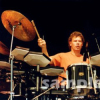Bill Bruford

Bill Bruford
William Scott "Bill" Brufordis an English retired drummer, percussionist, composer, producer, and record label owner. He was the original drummer for the progressive rock group Yes, from 1968–1972. Bruford has performed for numerous popular acts since the early 1970s, including a stint as touring drummer for Genesis in 1976 and U.K. in 1978. Following his departure from Yes and at various times until 1997, Bruford was the drummer for progressive rock band King Crimson. Then, Bruford moved away from progressive...
NationalityBritish
ProfessionDrummer
Date of Birth17 May 1949
I didn't write any music at all, and then, I remember Jon Anderson being very insistent saying that there were two kinds of musicians: the ones who wrote music and the ones who didn't. And clearly the ones who wrote music were more superior human beings in his mind. So he kind of nudged me and sort of prodded me into it. I picked it up slowly. Then I learned more about chords and harmony and I just kept adding to that. One of the great things about having good players in your band is that you just ask them questions. You can pick up some good information that way.
Holding on to some of your uniqueness is the trick instead of surrendering it at the Academy of Contemporary We're Gonna Make You a Star.
One of the great things about having good players in your band is that you just ask them questions. You can pick up some good information that way.
People come with expectations and as a bandleader I constantly try to remind the audience to leave its expectations in the lobby.
We used to drink an awful lot of alcohol.
I don't really remember a whole lot of sex, drugs and rock n' roll, really.
This amateurism however, can sometimes be helpful in forging a style; you have to work around your weaknesses.
At the end of the whole day of working with people you want some privacy.
Close to the Edge, Red, One of a kind, Discipline, Earthworks, The Sound of Surprise, all seem to me to be albums that captured the essence of the intention.
The best practice you can get is on the bandstand, but in between gigs I feel I have to stay in shape.
We were from totally different social backgrounds. This is what is very hard for an American to understand, but we could have been five guys from Mars.
So I have the classic amateur's technique; I know some very tricky bits and I have large gaping holes.
And I like messing around in the engine room of music. Seeing what happens in the rhythm section area.
I warm naturally to the drummer whose ideas and approach are strong, even if he doesn't quite have the ability to carry them out.